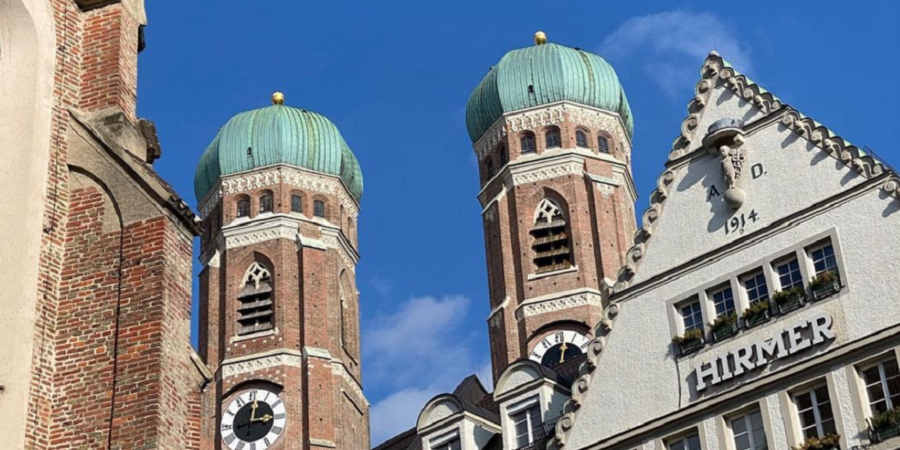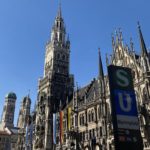Raise your hand if you’ve been to Munich – lots of you. Now raise your hand if you’ve been to Munich outside of Oktoberfest – almost no one. I’ve lived here for years, I love this city, and in this article, I want to share it with you outside the Wiesn season with an easy-to-follow three-day itinerary, including restaurant recommendations.
At the end of the article, you’ll find a handy guide to screenshot.
You can read this article in Italian here.
View this post on Instagram
What to See in Munich
For over 10 years, every time I visit a European city, I book an online free walking tour – a guided tour where you pay a tip at the end (I’ve seen tips range from €5 to €50 per person). In Munich, I tried the English tour by Heart of Munich through Guru Walk, but you can find many tours in all languages by googling “free walking tour Munich.”
The tours usually cover these spots:
- Frauenkirche:Munich’s famous cathedral with two towers
View this post on Instagram
- Marienplatz with Neues Rathaus and Altes Rathaus: the glockenspiel show is at 11 a.m., 12 p.m., and 9 p.m. (at 5 p.m. during certain months)
- Peterskirche: a church where you can climb up for a city view
- Viktualienmarkt: a market offering local and international products
- Hofbräuhaus: the most famous beer hall, especially for Italians
- Asamkirche (St. John Nepomuk Church): stunning inside and out, located on a shopping street
- Residenz: the Royal Palace, worth visiting (tickets are €7–€11)
View this post on Instagram
Outside the city center but worth visiting and reachable by public transport:
- Schloss Nymphenburg: a beautiful royal palace with a huge garden (park entrance is free)
View this post on Instagram
- Deutsches Museum: a huge science and technology museum, loved by kids
- BMW Museum: BMW stands for Bayerische Motoren Werke (Bavarian Motor Factory), and the car manufacturer was founded here in 1917
- Au-Haidhausen district: known for its French-style architecture, chic venues, and one of the city’s nicest beer gardens, Wiener Platz
View this post on Instagram
- Glockenbach district: a gay-friendly area near the city center
- Maxvorstadt university district: the nearest subway stop is, of course, Universität (U3 U6)
What to Do on Sunday in Munich
Let’s start with a fact: Bavaria has special rules that encourage outdoor leisure activities. Because of this, all shops and supermarkets are closed on Sundays. Yes, you read that right – shopping or grocery shopping on Sundays is impossible, unless you’re willing to pay a premium at the only open supermarkets in Hauptbahnhof and Ostbahnhof stations.
So, what to do on a Sunday in Munich? Enjoy nature or visit a museum.
View this post on Instagram
Museums for €1 in Munich (on Sundays)
Many museums have a €1 entrance fee on Sundays. I recommend taking advantage of this deal (many of the museums are in the same area, so you can easily visit more than one):
- Glyptothek and Staatliche Antikensammlung: museums with Greek and Roman sculptures collected by King Ludwig I
View this post on Instagram
- Pinakothek der Moderne: a modern art museum focusing on the 19th and 20th centuries
- Alte Pinakothek: a museum with works by Van Gogh, Monet, Titian, Raphael, Caspar David Friedrich, Goya, Delacroix, Rubens, and more
- Museum Brandhorst: contemporary art museum
- Staatliches Museum Ägyptischer Kunst: Egyptian art museum
- Museum Fünf Kontinente: ethnographic museum featuring pieces from the Americas, Africa, Asia, and Oceania
Munich’s Parks
Munich is full of parks – full! I recommend visiting at least one, and maybe even having a picnic. Here’s more information:
- Englischer Garten: one of the largest urban parks in Europe, perfect for a picnic and even a swim! Many people jump into the (very cold) Eisbach stream, float down, then climb out using a ladder and take the tram back to the starting point. The Englischer Garten is also known for its surfers, its beer garden under the Chinese Tower, and the nudist area.
- Olympiapark: Built for the 1972 Olympics, the park is now home to events like the summer Tollwood festival, the concert venue Olympiahalle, and the Olympia Tower (you can go up for a 360-degree view of the city; admission is €13).
- Westpark: located in the west of the city, this park features a Japanese garden, a Thai temple, and a small Chinese garden.
View this post on Instagram
- Hirschgarten: a small park also in the west, famous for its deer! (Hirsch means deer; remember to bring carrots to feed them.)
- Maximiliansanlagen: more of a green area than a park, it runs along the Isar River. I love walking there. Start at Isartor and finish at the Friedensengel statue.
Where to Eat Traditional Bavarian Food in Munich
Pork knuckle? Pretzels with Obatzda cheese? Bratwurst? Leberkäse? Potato salad? Käsespätzle? Kaiserschmarrn? If these dishes make your mouth water, you’re looking for a traditional Bavarian restaurant.
The most authentic experience is a Biergarten – large outdoor areas with wooden tables, self-service food, and liters of beer. Fun fact: in traditional Biergärten, you’re allowed to bring your own food as long as you buy drinks. Here are some of the best ones:
- Biergarten am Chinesischen Turm: huge beer garden at the foot of the Chinese Tower in the Englischer Garten – not the best food, but it’s definitely one of the largest and most popular
View this post on Instagram
- Zum Flaucher Biergarten: beer garden immersed in nature in the southern part of the city
- Hofbräukeller am Wiener Platz: beer garden with colorful lights in Au-Haidhausen
- Augustiner-Keller Biergarten: a massive beer garden near Hackerbrücke station (those arriving by Flixbus will know it well)
If you prefer indoor dining at a traditional restaurant, here are some suggestions:
- Paulaner am Nockherberg: huge venue, one of the Starkbierfest locations in March
- Wirthaus Hohenwart: modern take on a traditional restaurant in Obergiesing
- Augustiner Klosterwirt: right at the foot of the Frauenkirche, so very central but also frequented by locals
View this post on Instagram
- Alter Simpl: traditional restaurant in the university district
- Servus Heidi: modern take on Bavarian cuisine
- Max Emanuel Brauerei: traditional Bavarian restaurant
- Schneider Bräuhaus: for fans of Weissbier (wheat beer)
You don’t fancy Bavarian food? No problem, read my articles about pizza in Munich and my fav Italian restaurants in Munich (and I am Italian! you can trust me) and the Michelin starred ones. For those who want to eat good without spending much, I suggest visiting ITALYLUNCH at Lindwurmstraße 12 (U3 U6 Goetheplatz) and Färbergraben 6 (U3 U6 Marienplatz) for an affordable option, as the menus at this Italian fast food restaurant cost between €7.90 and €12.90 (with an Oktoberfest promotion of €5 for all menus).
What to Do in 3 Days in Munich: Practical Day-to-Day Guide
Okay, I’ve gone into a lot of detail about what to do, and you might feel a bit lost, so here’s a simple three-day guide to visit Munich, Germany:
Friday:
- Breakfast at the grandmas’ cafe Kuchentratsch (cakes are baked by grandmothers and grandfathers), or at the vegan Emmi’s, or at one of the many French bakeries like Dompierre
- Quick lunch in the city center at LeDu (Chinese dumplings) or Fishbowl (poke bowls), then shop around Odeonsplatz, Karlsplatz, and Sendlinger Tor with a snack stop at French Touch or Isabella Gluten-Free. Try on a Dirndl or Lederhosen at stores like Angermaier near Viktualienmarkt.
- Dinner at the Greek restaurant Paros in Au-Haidhausen, where they start dancing with the waiters after 11 p.m. on Fridays and Saturdays (it’s a blast!).
View this post on Instagram
Saturday:
-
- Italian breakfast in the city center at Eataly (ask for the Pistacchissimo!)
- Join a free walking tour starting around 10 a.m. at Marienplatz (offered year-round)
- In summer, have a picnic at the Englischer Garten or along the Isar River; in bad weather, visit a museum (the Paleontological Museum is always free, and everyone loves dinosaurs!) or see an English-language film at one of the city’s cinemas
- Dinner at a traditional Bavarian restaurant or Biergarten (see the list above)
- Enjoy karaoke at the Irish pub Kennedy’s, or head to a club like Sauna, Lucky Who, Call me Drella, or 089, or have a glass of wine after dinner at Gärtnerplatz.
View this post on Instagram
Sunday:
- Brunch at Café Faber, Café Puck, or Lilli P
- Visit one or more €1 museums, then relax in a park, or paint ceramics at Paint Your Style or Happy+Colorful Ceramics
- Enjoy dinner in the city center at Madam Chutney (Indian), in Schwabing at Lemar (Afghan), in Maxvorstadt at Seen (Chinese), or in Glockenbach at Soul Kitchen (pizzeria).
View this post on Instagram
Bonus for Those with Extra Time: Day Trips from Munich
If you have more time, consider a day trip by train. Ask for the Bayern Ticket at the station, which offers discounted travel within Bavaria for groups (the bigger the group, the cheaper it gets):
- Starnberger See: lake about 40/50 minutes by train
- Ammersee: lake about 40/50 minutes by train
View this post on Instagram
- Tegernsee: lake about 50/60 minutes by train – if driving, consider visiting Gut Kaltenbrunn am Tegernsee, a hotel with a traditional restaurant
- Nuremberg: town about two hours by train
- Salzburg: Austrian town near the German border, reachable in about two hours with the Bayern Ticket
View this post on Instagram
Hotels in Munich where to stay
Here are some hotels that friends have tried recently, available for booking on platforms like Booking.com:
- Living Hotel Prinzessin Elisabeth in Glockenbach (Geyerstr., 52)
- Holiday Inn Express Munich City West in Hirschgarten (Friedenheimer Brücke, 15)
- Hotel Concorde in Altstadt-Lehel (Herrnstr., 38)
- Schwan Locke in Theresienwiese (Landwehrstr., 75), very instagram
When to visit Munich
Munich is famous worldwide for Oktoberfest (here called Wiesn), but the city is also enjoyable throughout the year thanks to the many organized events (dates may change, so always check online):
- January-February: Okay, maybe the only time of year I don’t love Munich as much is during this period. The winter can be harsh, and you no longer have Glühwein (mulled wine) to warm you up… Temperatures can drop to -15°C (though rarely!). On the bright side, ski resorts are easily reachable, as well as thermal baths and saunas (note: most saunas in Germany require nudity and prohibit swimsuits).
- March: Munich is famous for its light beer, but not everyone knows you can also enjoy dark beer here, which even has its own festival, Starkbierfest, in March!
- April: Want a smaller Oktoberfest with better weather? Check out Frühlingsfest, which brings the city to life in the spring (Frühling means spring in German).
- May: Did someone say picnic? May is perfect for an afternoon in the park or along the river with a blanket and some snacks.
- June-July-August: Summer in Munich never gets too hot (I’ve never seen the thermometer rise above 33°C). This makes it a favorite time for families and locals who enjoy swimming in the Isar River or the Eisbach, or in one of the many nearby lakes. Another summer highlight is the abundance of festivals and events, like Kocherlball at the Chinese Tower, Tollwood Summer Festival, the Sommerfestival at Olympiapark, and the Superbloom music festival (featuring artists like Imagine Dragons and Martin Garrix).
- September-October: Oktoberfest always ends the first weekend in October and begins two weeks earlier (mid-September).
- November-December: Germans love Christmas so much that… I used to hate it, but since living here, I’ve caught the spirit! The winter Tollwood festival and world-famous Christmas markets usually open from mid-November to Christmas. It’s a must to warm up with a good Glühwein or Feuerzangenbowle.
Have you ever been to Munich for a long weekend? Let me know on Facebook or Instagram!
Feel like reading something else? Here the Munich food bloggers you should follow, the best pizza restaurants in Milan by area and the best pasta in Milan!




